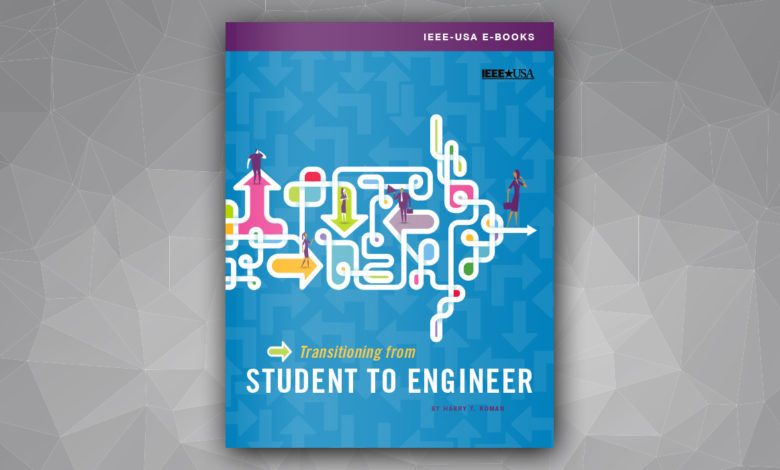
Calling all engineering students and recent graduates: If there is one thing that veteran educator Harry T. Roman wants you to know, it’s that 15 percent of your career will require technical skills–while 85 percent of it will demand professional or “people” skills.
“I’ve never witnessed an incompetent engineer being fired,” Roman says, “but I’ve seen engineering careers go terribly off-track because those engineers had poor professional skills.”
To help both engineering students and those who are in the earliest years of their careers, Roman has just written Transitioning from Student to Engineer. This month, IEEE-USA E-BOOKS is introducing this slim, but idea-packed, volume–overflowing with solid advice that everyone in its target audience should read and note.
The author of numerous other IEEE-USA e-books on career-development topics, Roman introduces the importance of people skills in a manner to which most students and young engineers will relate.
“For the past four or five years,” he writes, “you have been totally immersed in technical subject matter, probably barely tolerating a humanities course interlude here and there, and perhaps wondering why you even have to bother with it… Well, on the job, the humanities–in the form of professional, people and soft skills–reign supreme.”
Roman points out that engineering is more than being mathematically facile and technologically creative. “Ultimately,” he says, “it’s about people doing great things in service to other people and society–something no mathematical expression can quite capture.”
Early in the volume, the author lists 11 skills professors do not teach in engineering classes. However, he says every successful engineer must master these skills to succeed professionally. They range from good oral and written communications to building and participating on teams.
The importance of having mentors–and later, of becoming one–is something Roman is passionate about. “The world of work is all about process, not subject matter content; and mentors–people who have been down the process path before–are absolutely essential to your career,” he writes. The author notes that treating such individuals with respect, and showing a willingness to learn, can lead to rich rewards.
Roman says the sooner you can start building relationships with mentors in a new job, the better. “It won’t be hard,” he writes, “as they will likely come to you, offering help and keeping you from tripping over your own feet.” In fact, Roman says that any company that withholds mentoring from its employees, especially the new ones, is probably one you should soon consider leaving.
Perhaps the most valuable pages in Transitioning from Student to Engineer are in the chapter titled “Important Tips.” In two separate lists, the educator provides engineering students and new engineers with a wealth of practical ideas for building professional skills. For example, Roman encourages students to attend as many meetings, seminars and other engineering-related campus activities as possible–and to network at them. The networking should include meeting the guest speakers, who often are alumnae interested in the next generation of engineers.
He also advises incorporating meaningful work experiences into regular coursework, wherever and whenever possible. “Even a summer job in an interesting industry offers valuable experience with the rhythms and routines of engineering work,” he writes.
Above all, Roman recommends becoming a student member of a professional organization on campus, such as IEEE, and participating in it. “Most important, after you graduate, remain a member and continue your learning and professional development,” he says.
For new engineers in their earliest career stages, Roman urges that they begin as soon as possible, if they are interested in pursuing a Master’s degree. “Do it while you’re young and still academically fresh,” he writes, noting that many employers will pay much of the expense.”
A big believer in learning from failure, the author recommends keeping notes as a way to promote success. “Document how you used failure to aid success. All inventors, including Thomas Edison, championed learning from failure.”
An IEEE Life Senior Member, Roman holds 12 U.S. patents; and he has published more than 550 scientific papers, articles, monographs and books. His many honors and recognitions from IEEE and other organizations for his contributions to technology education include the 2015 Region 1 Excellence in Teaching Award. He also has published more than 70 resource books, science kits, and other educational products.
Now retired after a 36-year career with PSE&G, New Jersey’s largest utility, he spends many hours in the classroom working with teachers and students. He also co-teaches a graduate course at Montclair State University about applying STEM techniques in the classroom.
Transitioning from Student to Engineer, by Harry T. Roman, is available at https://ieeeusa.org/shop/ for $2.99 for members and $4.99 for non-members.
Helen Horwitz is an award-winning freelance writer who lives in Albuquerque, N.M. She was with IEEE from 1991 through 2011, the first nine as Staff Director, IEEE Corporate Communications.






